|
Barham
Womenswould
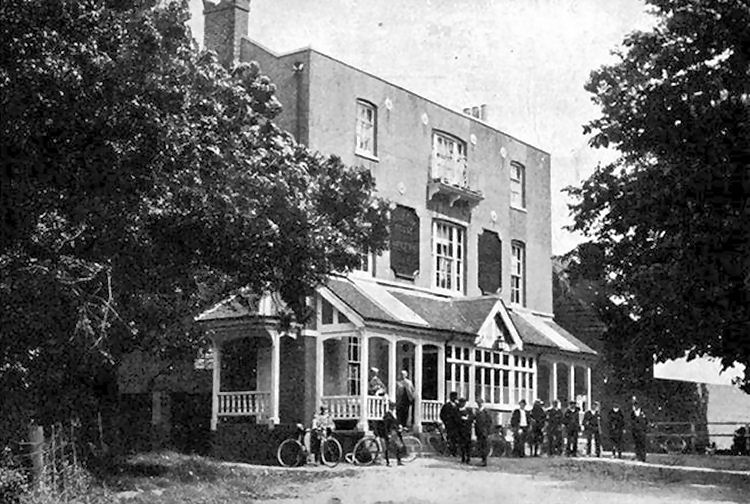
Above photo circa 1910. |
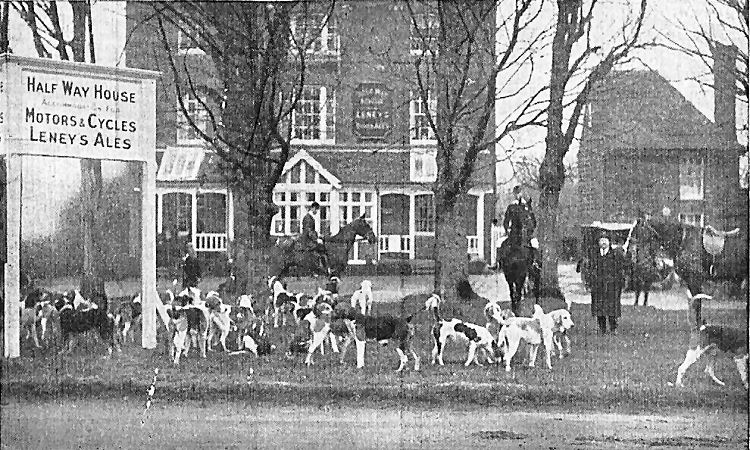
Above picture showing the East Kent Foxhounds at a meet outside the
"Halfway House" on Saturday 8th April 1922. |
|
From the Dover Express 10 December 1926.
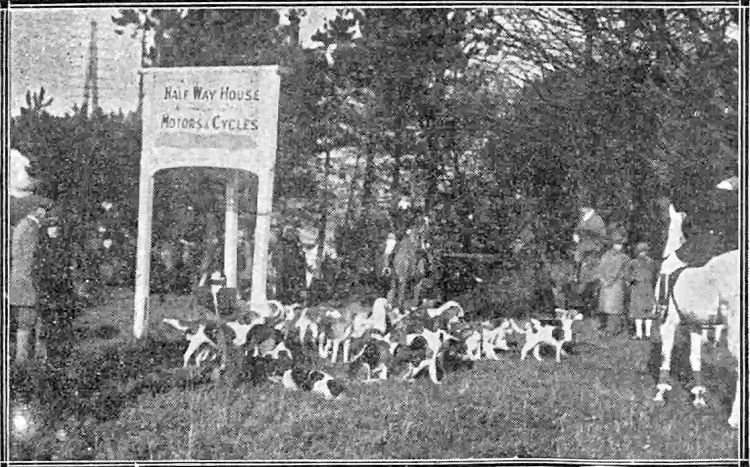
Above photo showing the East Kent Foxhounds at the "Halfway House." |
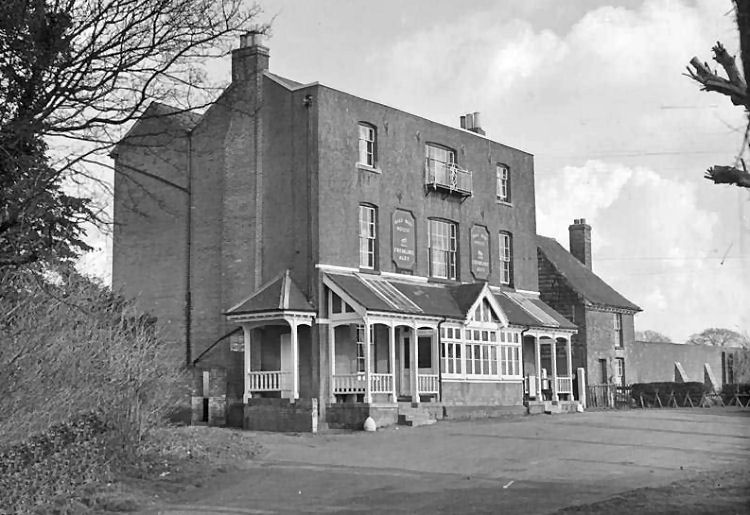
Above photo, circa 1949, kindly sent by Rory Kehoe. |
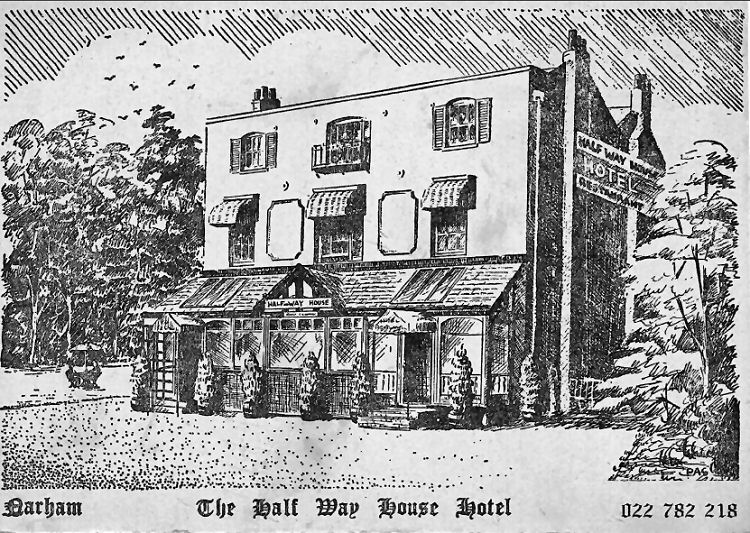
Above postcard, date unknown, kindly sent by James Street. |
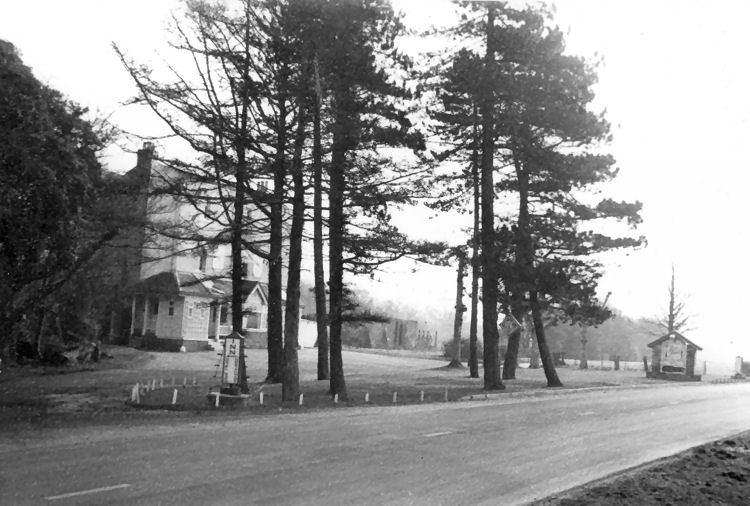
Above photo 5 March 1963, kindly sent by Clive Bowley. |
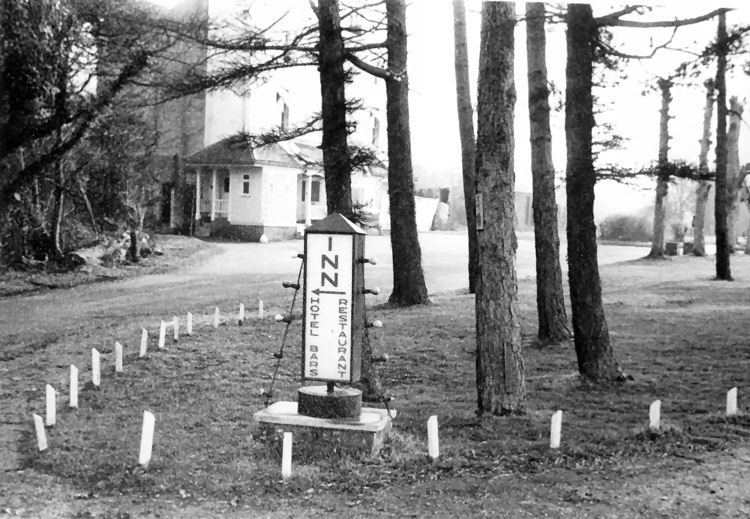
Above photo 5 March 1963, kindly sent by Clive Bowley. |
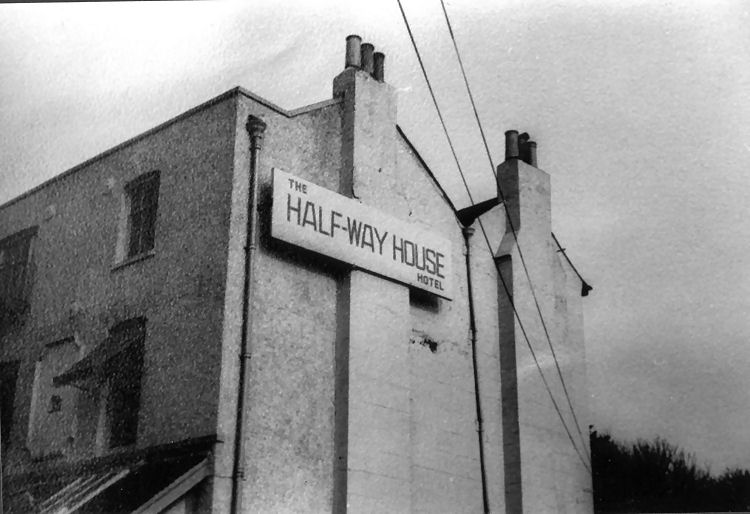
Above photo 5 March 1963, kindly sent by Clive Bowley. |
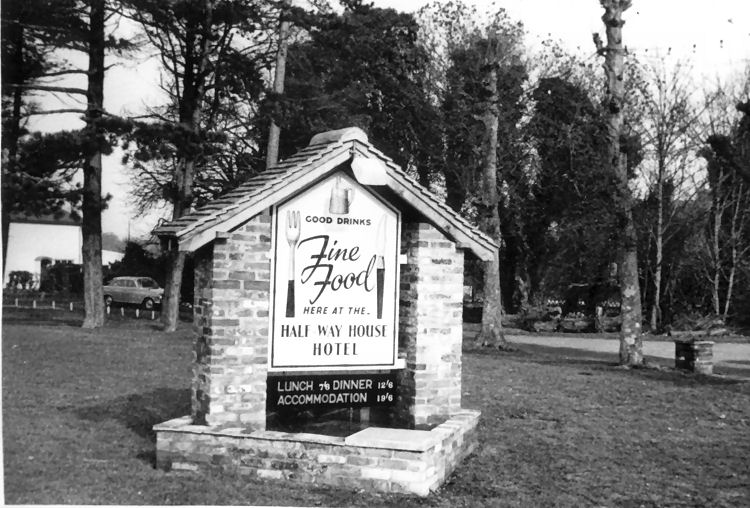
Above photo 5 March 1963, kindly sent by Clive Bowley. |
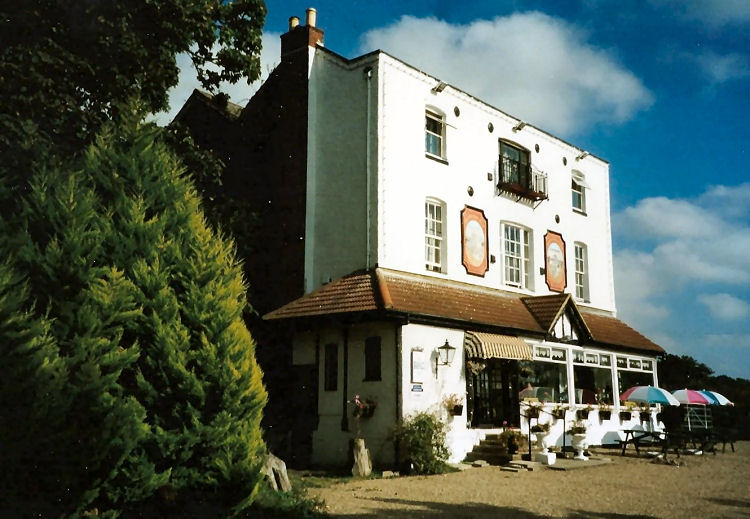
Above photo 1995, kindly submitted by Ray Hopkins. |
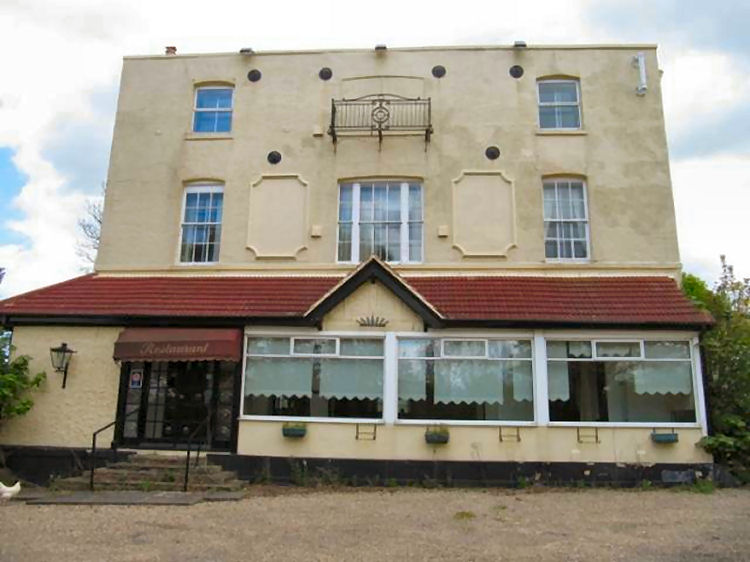
Above photo, date unknown by Darkstar. |
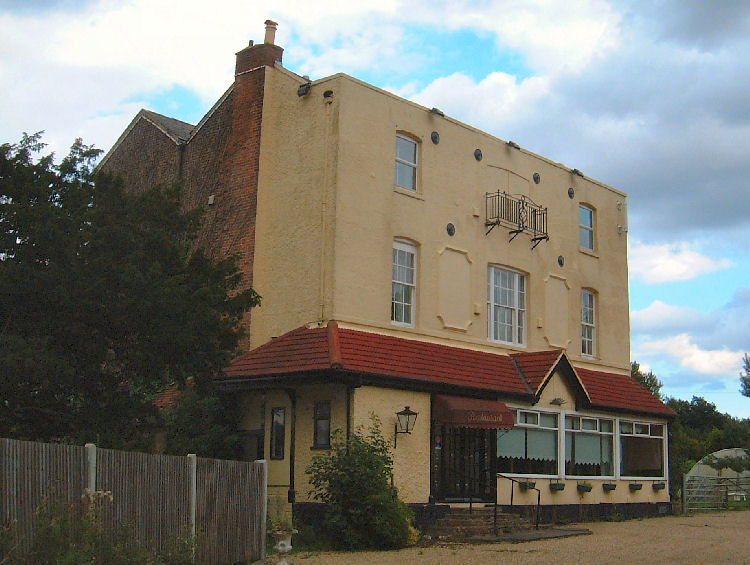
Above photo by Paul Skelton, 22 Aug 2008. |
Supplied by Alfred Leney Co Ltd, who bought out Thomas Walker's Phoenix
Brewery in 1859 and registered as such in 1896, until bought out by Fremlin
Brothers brewery of Maidstone in 1926, brewing at the Dover brewery ceased
in 1927, which later passed to Whitbread.
Also addressed as at Womanswould
in the Post Office Directory 1913

Around about the 1960s the premises was more of a hotel than local's
public house where it catered for the increasing Cross-Channel Ferry
services.
|
St Mary's Dover baptism 24 July 1718.
Susanna HAMILTON, daughter of
Francis and Margaret. The poor woman's maiden name is Margaret BROWN,
her childbed pains fell upon her at the Halfway House where she was
delivered betwixt Canterbury and this town. And she brought her child to
my house and I christened it. She herself, an ancient father and mother
are going to New England where they say this Francis HAMMILTON is
settled in a plantation left him by a deceased brother who lived there.
|
|
Kentish Gazette, 31 June, 1779.
Notice.
Whereas a malicious, menacing, impudent, and insulting letter was
received by Sir Henry Oxenden, Bart. on the
17th of July last past, from the "Halfway House," near his Seat at
Broom, in the parish of Barham, County of
Kent, where all Post Letters for that Neighbourhood are left.
And whereas the letter was wrote and sent without the least Cause of
Provocation; and that it is believed that
more than one was concerned in the dark Transaction; whoever will
(within one month from the date hereof)
give such an Account of this Affair, as may be the Means of bringing
the Offender or Offenders to Light, shall
receive £50 Reward, even although the Person making this Discovery
be one of the Accomplices.
This information may be given to Sir H. Oxenden himself, or made
before any Magistrate in London or in this
Country.
Broom, August 28th, 1779.
|
|
From the Kent Herald, 4 January 1827.
On Thursday night last, some thieves broke into the seller of the "Halfway
House" between Dover and Canterbury, and stole the entire stock of spirits,
together with an earthen measure which they took from under one of the beer
butts. This measure and an empty cask were found in a shave a short distance
from the House.
|
|
Kentish Chronicle, 10 March, 1829.
The "Half-Way House," on the Dover Road, was broken open on Saturday
night last, and money to the
amount of eleven pounds stolen, and four silver tea spoons.
|
|
From the Kentish Gazette, 28 November 1837.
UNDERWOOD. TO BE SOLD BY AUCTION,
AT the "Halfway House, in the parish of Womanswould, on FRIDAY, December
the 8th, 1837, at Two o’clock in the afternoon,
TWENTY ACRES of Valuable UNDERWOOD, in Woolwich Wood, belonging to the
Trustees of the late Sir Henry Montresor, K.C.B.
Half-part of the Purchase Money to be paid on the day of Sale.
John Castle, Woodreeve, will show the cants.
|
|
From the Kentish Gazette 6 November 1838.
UNDERWOOD. TO BE SOLD BY AUCTION,
AT the "Halfway House," Womenswould, on TUESDAY, the 13th of
November, 1838, at One o’clock at noon, about TWENTY ACRES, in
Woolwich Wood.
John Castle, Woodreeve, will show the cants.
One-half of the purchase money to he paid on the day of sale.
|
|
From the Dover Telegraph and Cinque Ports General
Advertiser, Saturday 20 April, 1839. Price 5d
SHEEP STEALING
This offence is still carried to a great extent in the neighbourhood.
Two Wethers belonging to Messrs. Phipps, were slaughtered in a meadow in
Pineham, between Saturday night and Monday morning last, and the
carcases carried away.
On Tuesday night, or early on Wednesday morning, some miscreants
slaughtered, in a most slovenly manner, three fine two year old Marsh
Wethers, belonging to Mr. Harvey, of Elvington, and carried away the
carcases, leaving the skins and entrails. The sheep were put out to
keep, and were in a field nearly opposite "Halfway House," on the Dover
road to Canterbury. This offence is now becoming so common in that
neighbourhood, that three considerable occupiers have offered ten pounds
each to any one of their labourers, in addition to other public rewards,
who will at any time detect or lead to conviction any offender of this
nature. It is generally supposed that an establishment of rural police,
would be highly advantageous.
|
|
Kent Herald, 13 March 1845.
Nisi Prius Court. (Before Lord Denman and common juries.)
Hoskins v. Bullock.
Mr. Sergeant Channel, with Mr. Peacock, appeared for the plaintiff; and Mr.
Serjeant Shee and Mr. Bovill for the defendant.
It appeared from the opening and the evidence of the learned Surjeant that the
plaintiff had formally kept the "Halfway-house" between Canterbury and Dover,
whose daughter had married a person named Smith, a farmer, at River, to whom she
had lent various sums of money at different times. In 1843 she left the
"Halfway-house" and went to reside with Smith. In July, 1844, in order to secure
herself with reference to the sum of money she had lent, she had the whole of
the stock in the farm valued, and paid the difference to Smith between the sums
he had borrowed and the amount of the valuation. The business was, however,
still carried on in Smith's name, which was on the wagons and carts, for the use
of which, and the implements, Smith was to pay a yearly rent. Smith owned £156
to the defendant, who sued him and obtained judgment for that sum. The sheriff
sold the stock in January, 1845, although the plaintiff gave notice that the
property belonged to her.
The receipts of the sums of money, and the making over of the property, were
proved by Mr. and Mrs Smith. The valuation was proved by the valuer, Mr.
Coleman.
Mr Serjeant Shee, in addressing the jury for the defendant, contended - that Mr.
Bullock, the defendant, whom Mr. Smith had succeeded in the farm, and to whom
Smith owed the sum of money above named, on account of the valuation at entering
it, had been robbed of the £156 in order to favour Mrs. Hoskins. The learning
counsel also argued that no idea had ever existed of transferring the property
to Mrs Hoskins, until Bullock was pressing Smith for payment, and that Smith
having insured his furniture for £300, and sold it on his own inventory to Mrs.
Hoskins for £91 - had thus shown that the affair was a mere blind to preserve
Bullock's property which Smith held against the fair and honest claim which he
had upon it.
Lord Denman left the question, whether or not the transfer of property to Mrs.
Hoskins was bona fide; adding, that if a man in difficulties chose to make over
his property to any person for a valuable consideration, there was no law to
prevent him.
The jury, after a few minutes consultation, found for the defendant.
|
|
From the Dover Telegraph and Cinque
Ports General Advertiser, Saturday 29 January, 1848. Price 5d.
COMMISSION OF LUNACY
A Commission was open yesterday at the "Half-way House," before
Francis Barlow, Esq., one of the Masters of Lunacy, under a writ De
Lunatico quirendo, (a writ directing an inquiry as
to whether a person named in the writ is insane) to enquire
into the state of mind of Charles Cole Reynolds, Esq., who is residing
with the Rev. C. Borckhardt, at Lydden vicarage. It was attended by Mr.
Byrne, of the firm of Sweeting and Byrne, of Southampton Buildings; and
their agent, Edward Knocker, Esq., J. Walter Esq., and Wm Sankey, Esq.,
surgeons, were examined; as were also Mr. Borekhardt and Edward Reynolds
Esq., a brother of the supposed lunatic. The jury was composed of 23
good men and true of the country; and they came to the unanimous
conclusion that Mr. Reynolds was of unsound mind, and had been so since
January, 1839.
|
|
Maidstone Journal and Kentish Advertiser, Saturday 16 July 1859.
To let by tender.
The following public houses situate in and near Dover, Eastry, and
Folkestone, viz:-
1. The "Bull Inn," Eastry.
2. The "Halfway House" and land, on the Dover and Canterbury Road.
3. The "Chequers," at Folkestone.
4. The "Chequers" and land, at West Hougham.
5. The "Red Lion," at Charlton.
6. The "Fox," in St James's Street.
7. The "Ordnance Arms," in Queen Street.
8. The "Cause is Altered," in Queen Street.
9. The "True Briton," on Commercial Quay.
10. The "Three Kings," in Union Street.
11. The "Fleur-de-Lis," in Council House Street.
12. The "Cinque Port Arms," in Clarence Place.
13. The "Red Lion" in St James's Street.
14. The "Dolphin," in Dolphin Lane.
The above houses are to be let as free houses, in consequence of the
proprietors of the Dolphin Lane Brewery discontinuing that business.
The holdings of the present Tenants expire under notice to quit, as follows,
viz:- No. 2, on the 6th January next, No. 3, on the 6th July, 1860, No. 10,
at Lady Day next, No. 13, on the 23rd October next, No. 14, on the 6th April
next, and reminder on the 11th October next.
Tenders must be sent into the offices of Mr. Edward Knocker, Castle Hill,
Dover, on or before the 20th day of July next, marked on the cover "Tender."
Particular and Terms of hiring, with the forms of Tender, to be obtained on
application to Mr. knocker, or Mr. Thomas Robinson, Estate Agent, Bench
Street, Dover.
Tenders may be given for the whole together or separately. The Tenders will
be accepted subject to the houses being sold on or before the 20th day of
September next, and the proprietors do not bind themselves to accept the
lowest or any tender.
N.B. The proprietors are open to treat for letting the Brewery, Malthouse,
and Premises, in Dolphin Lane.
Edward Knocker. Castle Hill, Dover, June, 1859.
|
|
From the Kentish Chronicle and General Advertiser, 22 March, 1862. Price 1 1/2d.
Henry McLellan, John Watson, and Alfred Smith were brought up in
custody, charged with having, on 14th instant, at Barham, stolen a box
value 2s., property of Reuben Smith, of Eythorne.
It appeared that the prosecutor and prisoners were drinking at the
“Half-way House,” and one of the prisoners sold the prosecutor the box
for 2s. Shortly afterwards, while the prosecutor was playing at dice,
the prisoners left the house, taking with them the box. On discovering
the loss, the prosecutor followed the prisoners on the road towards
Canterbury, and succeeded, alter a scuffle with one of them, in
recovering the box. He then gave information to the police, and the
prisoners were subsequently apprehended in a public house at Bridge.
The prisoners were all sentenced to fourteen days’ imprisonment with
hard labour.
|
|
From the Kentish Chronicle, 30 January, 1864.
TROTTING MATCH for £20.
On Monday afternoon a trotting match, for £10 a side, took place on the
Canterbury and Dover Turnpike road, between a cob belonging to Mr.
Burren, of the “Providence Inn,” Northgate, Canterbury, and it chestnut
mare belonging to Mr. Charles Hornsby, of the “Duke of Cumberland Inn,” Barham. The distance was two miles—from Lydden Hill to the “Halfway
House.” Belting was even at starting, and the match, which was a very
close and exciting one, terminated in favour of Mr. Burren’s cob by two yards, The
two miles was accomplished in two seconds under seven minutes.
|
|
From the Whitstable Times and Herne Bay Herald. 19 October 1867. Price 1d.
ASSAULTING A PUBLICAN
At the County Police Court, Canterbury, on Tuesday last, William Adams
of London, was charged with assaulting James Wanstall, landlord of the
"Half Way House" on the Canterbury road, and also with breaking a window
at the house. The prisoner had been lodging at complainant's house, and
being a noisy, troublesome fellow the landlord determined to get rid of
him. On telling him he must go the prisoner committed the assault
complained of and broke a square of glass. He was given into the custody
of P.C. Munns. Committed for 14 days' hard labour. |
|
From the Dover Express and East Kent Intelligencer,
10 July, 1868. Price 1d.
COUNTY POLICE COURT
Arthur Finn, 16, a waggoner's mate, employed by Mr. Knight, at Old
Park, was charged with stealing two pigeons, the property of Mr.
Frederick Arter, of the "Half-way-house," Womanswould.
Frederick Arter: I live at the "Half-way-house," in the parish of
Womanswould, and am a farmer. I have been in the habit of keeping
pigeons in my stable, and saw some young men there a fortnight ago.
Since then they have been left in charge of a boy named William Dunn. On
Saturday last two of the pigeons were lost. I believe those produced are
the same. Their value is 1s. 6d.
William Dunn: I am in the service of Mr. Frederick Arterm and have
charge of his pigeons. On Saturday morning the prisoner came to my
master's stable, and put his horses there. After that he went into the
house. When in that stable prisoner talked to me about the pigeons,
asking where they were kept, and where it was they had their young ones.
I told him they had them all over the loft. Some time afterwards the
prisoner and another man again came to the stable and harnessed their
horses, and when the horses went away the prisoner remained a few
minutes behind. I noticed that when he came out of the stable he
appeared to have something under his jacket; and after the waggon had
moved away I went into the stable and saw that two of the pigeons were
gone. I then ran after the prisoner and asked what he had done with the
pigeons, and he replied that he did not know any thing about them.
Afterwards I watched the prisoner and saw him go behind a faggot stack,
and on going to the faggots I found that he had lain one of the pigeons
there. I also, at the same time, saw him take another pigeon from under
his smock. I picked both of them up. The pigeons produced are the same.
Prisoner denied that he had one of the pigeons under his jacket. He
said that when he went behind the faggots he saw the pigeons there, but
he did not know anything about them.
The case was remanded to the next Special Sessions at Wingham, to be
held on the first Thursday in August; and prisoner was bound over in his
own recognizance's of £10 to appear on that day.
|
|
Whitstable Times and Herne Bay Herald, 26 February 1870.
WOMENSWOULD. A Day's Sport.
On Wednesday last a number of gentlemen from Canterbury and Dover
assembled at Mr. Arter's, "Halfway House Inn," and from thence started
for the well-stocked woodlands on the Broome estate to enjoy the sport
of rabbit shooting. In the course of a couple of hours' shooting about
50 hares and rabbits were bagged, and although the grins were somewhat
numerous for the thickly wooded covets, there was fortunately no mishap.
Early in the afternoon the company adjourned to a meadow near Mr.
Arter's hostelry to witness a match at sparrow shooting between teams of
four each from Canterbury and Dover. The Dover party proved themselves
to be the best shots, for the day at least, the score being— Canterbury,
9; Dover, 12. In the evening about 20 gentlemen sat down to a capital
dinner, provided by Mr. Arter, and the after-dinner toasts included the
health's of Sir Henry and Mr. George Oxenden for their kindness in
allowing the "shoot” to take place over their land.
|
From the Whitstable Times and Herne Bay Herald. 7 April 1900. Price 1d.
WOMANSWOLD. DEATH OF AN UNKNOWN MAN.
The East Kent Coroner (R. M. Mercer, Esq.) held an inquest on Saturday
at the "Half Way House," Womenswold, on the body of a man unknown. The deceased was seen on the 29th inst. by a man named Driver, on the
Barham Road, lying by the side of the road. About half an hour
afterwards he saw him get up and stagger against a fence. Witness went
to his assistance and found he was dead. Dr. Cole, of Barham, made a post mortem, and found death was due to
croupous pneumonia and heart failure. The jury returned a verdict accordingly. |
|
From the Whitstable Times, 16 June, 1900.
WOMANSWOULD. OBTAINING FOOD AND LODGINGS BY FALSE
PRETENCES.
Arthur Leighton, whose mother resides in Canterbury, was charged on
remand with incurring a debt of 4s. 6d. with Thomas Norris, landlord of
the "Half Way House," Womanswould, without having the means to pay the
same.
P.C. Boots deposed that on the 11th instant he went to prosecutor's
house, and in consequence of a complaint ha made, he asked prisoner what
he meant by not paying for the board and lodging. He replied that he
would pay when he left, and handing witness a pocket book said there was
money in it. Witness examined it and found there was no money inside.
Prisoner then said he had a stick which was worth £5. Witness found five
pawn tickets in the pocket book. He brought prisoner to the police
station at Canterbury and when searched no money was found on him.
Prosecutor deposed that at 8 p.m. on the 10tkth inst., prisoner came to
the house and asked to be served with tea. After partaking of it he
asked witness if he let beds. He replied "Yes," and prisoner arranged to
stay for the night, agreeing to pay 1s. for the bed. During the evening
he had three threes' of whiskey, and treated other people in the house
to two pints of ale and a glass of port wine. The following morning when
he got up he called for brandy and soda. He then asked for breakfast but
witness refused to serve him as he did not seem likely to pay. Witness
sent for P.C. Boots.
J. Norris, sister of last witness gave similar evidence, and added that
when prisoner asked for breakfast on the morning on the 11th inst., she
told him she did not think she could let him have it as she was rather
dubious about his paying. She told him she did not think he had the
money to pay for what he had had, but he male no reply.
Provost Sergeant Gill, stationed at Canterbury Barracks, said that
prisoner belonged to the 5th Lacers, and was discharged from Netley
Barracks awaiting his discharge from the Army, he having had a sun
stroke.
Superintendent Jacobs said that prisoner was discharged from Chartham
Asylum about a month ago.
Prisoner said that he was originally in India, and was sent to South
Africa. He came home from Platermaritzburg in December last and was sent
to Netley, but he had lost his papers that were given to him at the
hospital.
Prisoner’s mother said that he was a great trouble, and would have to go
back to Chartham as she could do nothing with him.
In reply to the Bench Provost Sergeant Gill said that he would take
prisoner to the barracks and get the medical officer to look after him
until something more definite was known about him. The Chairman said the
Bench, were of opinion that no jury would convict him on prosecutor's
evidence and he would, therefore, be discharged, and handed over to
Provost Sergeant Gill. Addressing prosecutor the Chairman told him to be
more careful as to who he took in his house in future.
|
|
From the Dover Express and East Kent News, Friday 4 May, 1906. Price 1d.
FOUND NEAR THE HALFWAY HOUSE. SUPPOSED ATTEMPTED SUICIDE
George Hasler, a torpedo man of H.M.S. Pembroke, was found unconscious
with a bullet wound in his forehead, in a field just off the highway on
the Dover Road near the “Halfway House” to Canterbury, on Monday
morning. Lying by his side was a small revolver, still loaded in five
chambers, and two had been discharged. Two men found Hasler in the field
at once called Police-constable Saunders, and Dr. Wilson, of Bridge, who
was sent for gave it as his opinion that the wound was probably
self-inflicted. A conveyance was obtained, and Hasler was taken with all
speed to the Kent and Canterbury Hospital, where he lies in a critical
condition. Hasler comes from a highly respected Ashford family, and his
father is a railway guard.
|
|
From the Whitstable |Times and Herne Bay Herald, 8 December, 1906.
THEFT OF A HOSPITAL COLLECTING BOX. WINGHAM MAN CONVICTED.
Alfred Tong, labourer, of Wingham, was charged before Mr. F. H. Wilbee
(in the chair), Mr. J. Bowes, Mr. A. A. Kemp, and Mr. P. E. Iggulden, at
St. Augustine’s Petty Sessions at Canterbury on Saturday, with stealing
a Kent and Canterbury Hospital collection box from the “Hallway House”
at Womenswould on November 24th.
Mr. Horace Broughton appeared for the defendant.
George Castle repeated the evidence he had previously given to the
effect that he kept the “Halfway House” in the pariah of Womanswold. On
Friday week he saw the prisoner who entered his house at about eleven
o’clock. He called for some beer and bread and cheese. The next day,
Sunday, he saw prisoner about 5.55, when he came into the bar. He had
more bread and cheese and beer, witness serving him. Prisoner came in by
the private bar, and in the course of conversion witness said “Why, you
were here yesterday” and he said “No; that was my cousin.” Witness said
“You come from Wingham? and he replied “No; from Canterbury.” Prisoner
also said be had met his cousin that day in Dover, and they were so much
alike that people did not know them apart. His clothes were dirty and
prisoner accounted for this by saying he bad had a fall off his bike
while coming along. He enquired whether the market vans from Canterbury
had gone through to Dover, and witness said he expected they had already
gone through. The contribution box in question was standing on the
counter in the private bar, in which the prisoner then was. After
talking to prisoner for some few minutes he left the bar and went into a
private room. He was only gone five minutes, as he heard his puppy
whining in the bar. When he returned to the bar he found the bar door
open and the prisoner gone. He had left half his beer, and the
contribution box he missed about ten minutes afterwards. No one had
entered the private bar in the meantime. The box could not be seen from
where it stood in the private bar, by anyone in the public bar. The
pieces of box now produced belonged to the box missing from his house.
He then gave information to the police. There was more in the box than
they had ever had before judging from the weight, and 10% was taken from
it last week. On both occasions prisoner entered by the private bar.
In reply to the Superintendent, witness stated that owing to his son
having received benefit from the hospital his daughter made it a
practice to put something in every week, and customers often put some of
their change in. His grand-children used to put farthings in. Among the.
Among the coins found on prisoner was a George IV penny, which they used
to use for a musical box. This his daughter gave to the children to play
with, and one of them put it into the box.
William Henry Willmore stated that he was a groom, at present staying
with the last witness. On the Friday in question he saw the prisoner go
into the private bar. They had a conversation together, prisoner asking
witness whether he knew Harris, of Wingham. Witness said “No,” and in
reply to a further question said he did not know Long, of Wingham.
Witness told him he did not know much of Wingham, and prisoner said
“Then you don't know us.” Prisoner treated witness and several others in
the bar. Prisoner told witness he was going to Dover, and later witness
saw him start off on his bicycle in the direction of Dover. The next
(Saturday) evening witness saw prisoner come up to the house from the
direction of Dover, and enter by the private bar. Witness bade him
“Good-night,” as he was on his way to Dover. Witness was certain it was
the same man on both days.
P.C. Binfleld stated that at 7 p.m. on the 21st of November, from
information he received respecting the robbery, he proceeded to Wingham
and instituted enquiries. About 6.15 he saw prisoner standing in the
road near the “Lion Hotel”. Witness asked him his name, and he replied
“Long.” Witness asked him whether he was cycling on the Dover Road that
evening, and he replied “Yes, I rode from Dover to-night." Witness asked
him if he called in at the “Half-way House,” and he said “No; the last
house I called in at was the ‘Eagles.” Witness then asked him if he had
a drink at the house he called the “Eagles” he said, “I had a glass of
ginger beer there, but what do you want to know for?” Witness said
“There is a hospital box missing from the “Halfway House.” How much
money have you on you?” He said “I don’t know and handed witness a
quantity of money, mostly in coppers. Witness said “How do you account
for having so many coppers in your possession?” He said “I have taken
them in change. I have treated several people to-day and kept getting
Change.” Witness and prisoner went into the “Lion” stables, and he
placed the money on a box, used as a table, and placed his hand on top
of the money. Witness said to Long “Have you among this money a large
coin?" and he said No.” Witness showed him the large coin produced, and
asked him how he accounted for its possession. He said “I suppose I must
have taken it among other change.” Witness then asked Long if there were
any farthing amongst the money, and he said “No; there isn’t any.”
Witness replied “There are two,” and showed them to him. He said “I did
not know that I had them.” Witness asked Long if he had any more
farthings on him, and ha said “No; not one.” Witness then searched him
and found in the ticket pocket of his jacket three more farthings. In
his waistcoat pocket he found two more farthings, and asked prisoner to
account for them. He said “I didn’t know that I had them.” Witness then
counted the money, and found 17 pennies, 21 half-pennies, 7 farthings,
two sixpences, and the large coin referred to. Witness then charged
prisoner with stealing the hospital box and its contents from the
“Halfway House.” He said I should not think of doing such a thing.”
Prisoner's clothes were very dirty, and he asked him where he got all
the mud from. He said he got it through riding his bicycle. Witness
brought the prisoner to the police-station. On the 25th of November
witness made search for and found the broken hospital box. Some of the
pieces were lying on a field of green peat and other pieces on a piece
of ploughed land adjoining the highway leading from the Dover Road, in
the direction of Wingham, and about a mile from the “Halfway House.” One
piece of box was pressed into the ground and under this he found two
sixpences and 3 1/2 in coppers. This was on the ploughed land.
Beside this piece of box on the soft ground was the impression of a
bicycle wheel, and also the foot-print of a light boot. No nails were
shown, and it was a pointed toe boot size and similar to the one worn by
prisoner. Witness took the pieces of the hospital box to Mr. Castle and
he identified them as parts of the missing box.
In reply to Mr. Broughton, witness said he searched as he went along the
road, in different fields and the woods.
William Hobbs, landlord of “Moor’s Head,” Adisham, said he first saw
prisoner on Thursday morning, 23rd, and he saw him again on the Friday
and Saturday following. On the Saturday he first saw him about one
o'clock. Prisoner was waiting for the Dover train and treated several in
the bar. He saw him again shortly after six in the evening when witness
gave him some oil for his bicycle lamp. On this occasion prisoner also
stood treat. Prisoner spent about 1s. 2d. altogether in his house.
Mrs. Page, butcher, of Wingham, gave evidence to the prisoner coming
into her shop on the Saturday in company with a salvation Army officer,
when he paid 9 ½ d. in coppers for a pound of meat.
Henry Champ, landlord of the “Ship Inn,” Wingham, said prisoner came
into his house on Saturday night and treated several at the bar paying
for the drinks with coppers.
Defendant, who pleaded not guilty, gave evidence, stating that he had
only lately left the 2nd Battalion “The Buffs" after serving in South
Africa. He arrived home on November 19th and was supplied with a ticket
to Adisham and 10s. On Thursday he went to Preston to get his
settling-up pay amounting to £2 15s. 5d. On Friday he gave his mother £1
1s. 6d. to keep for him, and borrowing a bicycle went to Dover. He
stopped at the “Half-way house” for a drink and bread and cheese. When
leaving Dover he fell off his machine in crossing the tram lines and had
to return home by train. On Saturday he got the £1 1s. 6d. from his
mother and went to Dover to get his bike back and pay for it. On the way
back he again called at the “Halfway House” but he saw nothing of the
hospital box. On leaving the “Halfway House” he did not get off his bike
till he got to the public-house near Adisham Station. He absolutely
denied any knowledge of the box or that he had seen it before.
In reply to the Superintendent, defendant said he could only account for
the farthings found in his possession by the fact that he saved them for
his little brothers and sisters. He denied that he had said to anyone
that in leaving the “Halfway House” he saw someone tiding a bicycle with
something like a cigar box under his arm.
Mr. Broughton on his address to the Bench suggested that the large coin
found among prisoner’s money might just as well have got into the till
and been given in change as that the grandchild put it into the
collection box.
Defendant’s mother gave evidence to her son having saved his farthings
for the children.
The Bench said they had decided to convict prisoner, and Mr. Broughton
then asked that he might be bound over under the First Offenders Act.
The presiding magistrate said this practise of stealing collection boxes
was becoming all too prevalent in the district and the Beach notified on
the last occasion that they intended to put a stop to it. In view of
defendant's previous good character, however they would only fine him
20s., including costs, or fourteen days’ imprisonment.
Defendant's father paid the money.
|
|
From the Folkestone Herald, 17th November 1923.
EAST KENT HUNT.
Owing to an outbreak of foot and mouth disease in the county, the
appointments for Alkham and The "Halfway House" are cancelled. The meet
to-day (November 17th) will be at New Barn, Hastingleigh, instead of the
"Halfway House." Next week's fixtures are, Wednesday, 21st Nov., at
Newingreen at 11 a.m., and Saturday. 24th November, at Brabourne
Village, at 11 a.m.
|
|
From the Dover Express and East Kent News, Friday, 7
November, 1924. Price 1½d.
LICENSING
An occasional licence was granted to Mr. Hopkins, of the "Halfway
House," for a farm sale at Denton on November 19th.
|
|
From the Dover Express and East Kent News, Friday 6 May, 1927. Price 1½d.
THREE PARTS MOPPED AT THE HALF-WAY HOUSE
Harold Horace Barnes, Woolage, pleaded not guilty to assaulting and
beating James Henry Cotton and Albert Hughes and with using threats to
John Henry Hughes, who asked that the defendant should be bound over.
Thomas Henry Cotton, 18, Firs Road, Woolage Village, a miner, said: On
April 24th, at 9.30 in the evening, they were having a drink at the
“Half-Way House.” Defendant came up and said, “You're sitting there like
three Lords.” (Laughter.) “I could put all the three of you through the
window.” Defendant's brother later said, “Come on Tommy (to witness)
we're waiting on you.” The landlady telephoned the Police at Bridge.
When the Sergeant came he went towards their home, and they followed.
They went up to the path to the house, when Barnes suddenly sprang out
and hit Albert Hughes. He then hit witness in the eye.
Albert Hughes, 18, Firs Road, Woolage, a miner, said: As he turned the
corner the defendant hit him in the head and knocked him down. That was
the last he saw of him as he went into the house dazed.
Lord Fitzwalter: What did he do it for?
I don't know. We had not had a quarrel.
John Henry Hughes said that after they had all got in the house
defendant said that next morning they “had got to have the same what
Cotton had.” Witness had to stay from work the next morning because he
was afraid of what defendant would do.
Defendant, giving evidence on oath, said he believed he got a “bit
merry” at the “Half-way House.” He could not remember threatening anyone
there, and he could not remember anything of the other occurrences.
William Shaw, 6, The Place, Woolage, said they were about “three parts
mopped” at the “Half-way House,” and he did not know anything about it.
He stated that what took place near their home was a bit of a scuffle.
Cotton: Who struck you?
Not you, but your landlady did with her umbrella. (Laughter.)
Defendant was fined £1 on each of the first two summonses and bound over
on the third for 12 months. He was allowed a month in which to pay.
|
|
From the Dover Express and East Kent News, Friday, 6 October, 1933. Price 1½d.
BIG FIRE NEAR HALFWAY HOUSE
Shortly before midnight on Tuesday, P.C. L. Seymour, stationed at Barham,
discovered that the barn at Ropersole Farm, Barham (which is behind the
“Halfway House”, on the Canterbury road) was blazing fiercely. He awoke
the tenant, Mr. G. F. Collard, and telephoned for the Bridge Fire
Brigade. Mr. Collard and the Constable rescued four calves from the
adjoining cowsheds, which were soon after enveloped in flames. The glare
from the burning thatch of the barn and buildings was seen for many
miles around. The fireman, under Chief Officer S. Gilbert, arrived, and
with the little water available damped down the stables and the granary,
and also stopped the flames from reaching the house of Mr. Collard,
which was within twenty yards. The only water available was that from a
small rain water tank and from a shallow pond, so little could be done
to save the barn and its contents of unthreshed oats, barley and wheat.
A farm wagon, a cart, an old engine, and several agricultural implements
which were in the barn were totally destroyed. The damage to the
contents is estimated at £400. The buildings were the property of
Messrs. B. J. and J. Austin, of Grasmere Lodge, Thornfield Avenue,
Chesterfield. Besides the assistance rendered by P.C. Seymour, valuable
help was rendered by Sergt. Castle. The fire was extinguished by 1.30
p.m. on Wednesday.
|
|
From the Dover Express, 20 October, 1933.
LICENSING MATTERS.
The "Halfway House," Womenswould, was transferred from
John Sidney Whitlock to Ernest King.
|
|
From the Dover Express and East Kent News, 13 October 1939.
Albert Gordon Harold Betteridge, "Halfway House," Womanswould, was
granted a possession order in 21 days, in respect of a cottage in the
occupation of Jack McLaughlin.
|
|
From the
http://www.kentonline.co.uk
Drugs barons hid a skunk cannabis
factory producing "industrial amounts" of the illegal plants – inside a
17th century coach house near Canterbury.
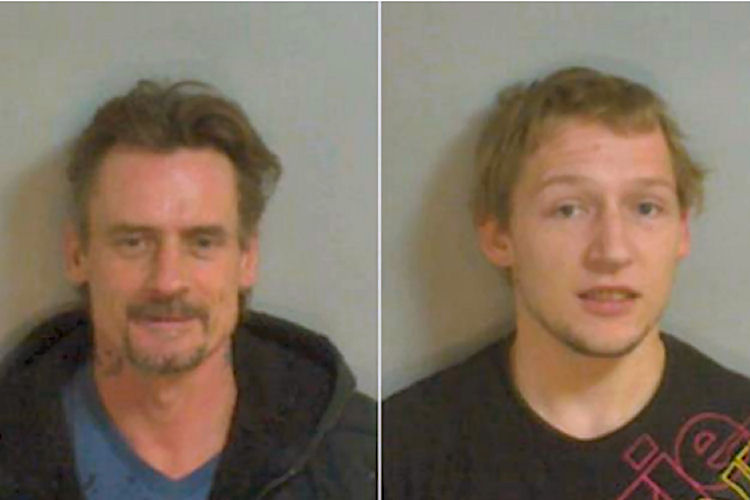
Stephen Randall (left) and Darren Barber jailed for drugs farm operation.
Ten rooms, which had once housed hotel guests, were lined with silver
insulation sheeting and converted into a sophisticated drugs farm.
Police who raided
the Old Coach House, in Dover Road, Barham, discovered
660 cannabis plants capable of raking in more than £1.5million a year
for the dealers.
The gang that ran the factory managed to bypass the electricity meters
to power the lights and hydroponic-Hotel used as £1.5m drugs farms needed
to cultivate the plants.
The new owners of the building, on a four-acre site, had allowed
father-of-two Steven Randall, 46, to stay on the site in a caravan as "a
caretaker".
But Canterbury Crown Court heard that behind their backs Randall was
part of the team that ran the operation – described as a "sophisticated
cannabis factory" with timer units, transformers and electrical fans.
He was jailed for four-and-a-half years after admitting cultivating
cannabis and illegally taking more than £4,000 of electricity to run the
operation.
Darren Barber, 21, of Plurenden Lane, High Halden, who was caught trying
to flee the former hotel, was jailed for two years and three months. He
admitted one charge of cultivation.
Judge Adele Williams told Randall, who has previous convictions for drug
offences: "This operation was capable of producing 37 kilos of skunk
cannabis per crop worth £1.5m a year. It was capable of producing
industrial quantities for commercial use.
"You were a caretaker, but I believe you played a significant role,
exercising management function.
"You were aware of the scale of this operation and were motivated by
making money."
Prosecutor Edmund Burge told how police raided the disused building last
December, when they found "a large and sophisticated cannabis factory".
He added: "Randall had been living on a caravan on the site in the hotel
grounds and when it was sold to new owners in 2008, he negotiated that
he would stay in his caravan in return for looking after the grounds and
offering security, on the understanding he didn’t go into the hotel
itself."
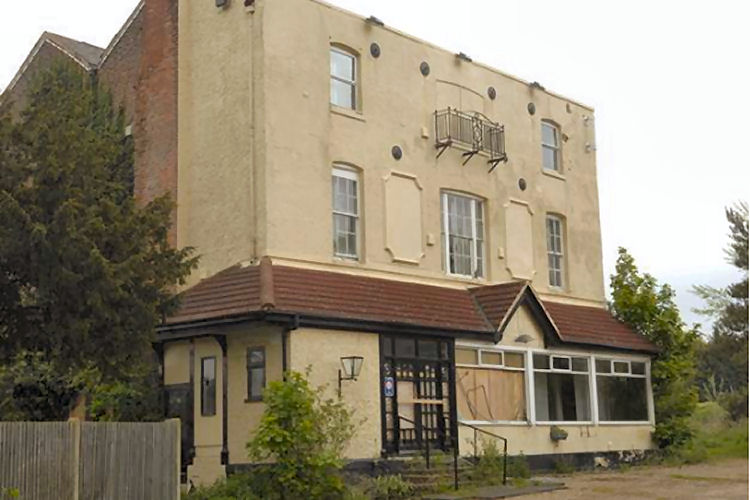
Officers found Randall in his caravan, together with small cannabis
plants, a shotgun and 64 cartridges.
The Old Coach House at Barham that was used as a drugs factory
Mr Burge said: "Police then entered the Coach House and as they did
Barber was seen to appear on a terrace on the first floor looking for a
means of escaping. Police called him to stop which he did."
He added that two electricity meters that fed the hotel had been
bypassed with bare wires and an electrical engineer later revealed it
was "extremely dangerous" – with a "loud hum" coming from the meters.
He said it was impossible to say just how much power had been stolen but
it was estimated at £4,100.
Mr Burge said: "This was a sophisticated operation in that 10 of the
rooms had been converted for the production of the drug, with a nursery
room, rooms for maturity and then drying rooms where the crop would be
cut."
The prosecutor said the new owners, a development company, "had been
looking to renovate it since 2008 and the building was unused for any
other purpose whatsoever".
Barrister Peter Alcock said Randall, a plasterer, was remanded in
custody awaiting trial – and had been told his caravan had now been
burned and all his property taken.
Police are now planning a financial investigation into both men's assets
to discover if there are cash sums which can be seized by the courts as
the proceeds of crime.
|
The building is currently being bulldozed. (February 2018).
|
From the
https://www.kentlive.news
11 February 2018. By Sian Elvin. Explore
the Old Coach House hotel in Barham which was abandoned 10 years ago and
once used as a drugs farm.
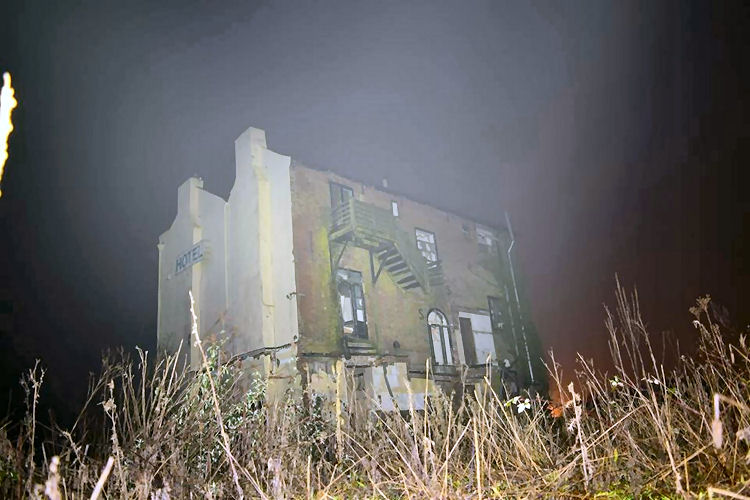
These are possibly the last ever images of the building as it is now
in the process of demolition.
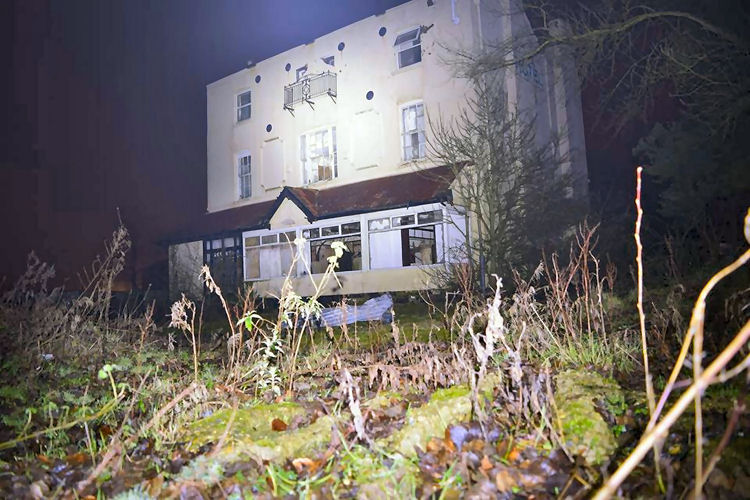
Footage and photos of the inside of an abandoned 17th century hotel
in Barham once used as a drugs farm has been revealed.
The Old Coach House, in Barham, is now in the process of being
demolished after work started on the site at the beginning of February.
And before the demolition started an explorer decided to go and
capture possibly the last videos and pictures of the inside of the
building, which was thought to have been abandoned around 10 years ago.
Lee Webb lives in Ashford and runs Our Abandoned World, a group of
friends and enthusiasts who have a love for urban photography and
extreme tourism.
He has provided Kent Live with these intriguing images and footage
from the inside of the dilapidated building.

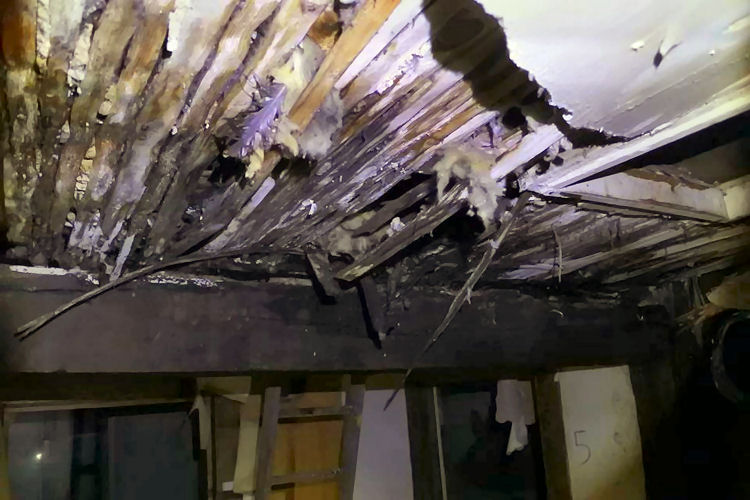
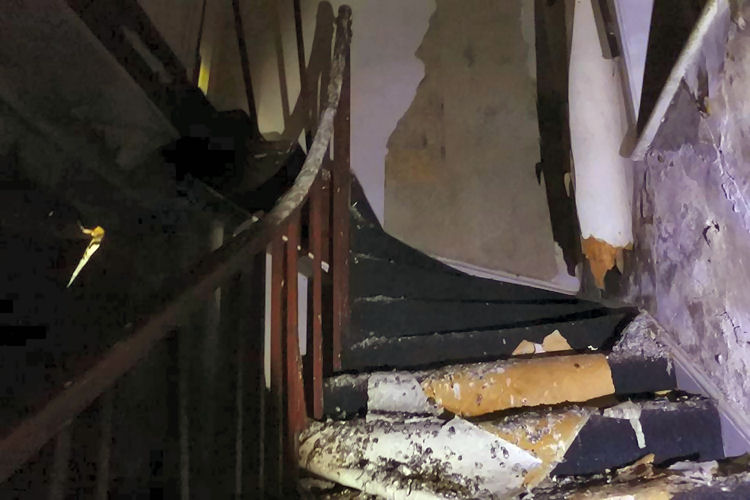
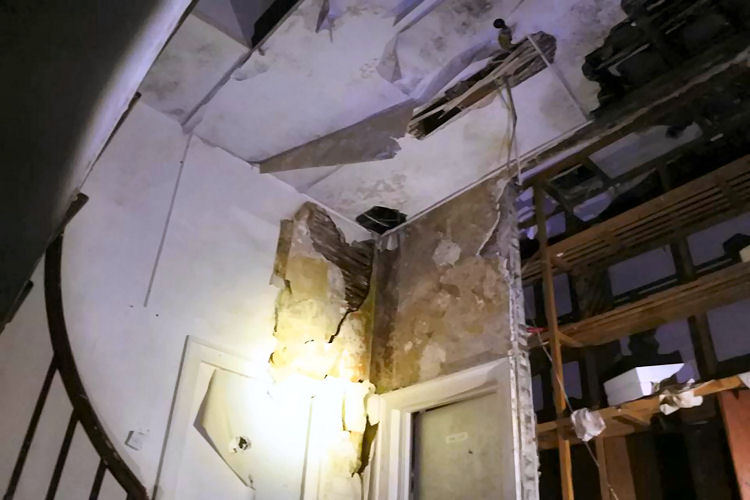
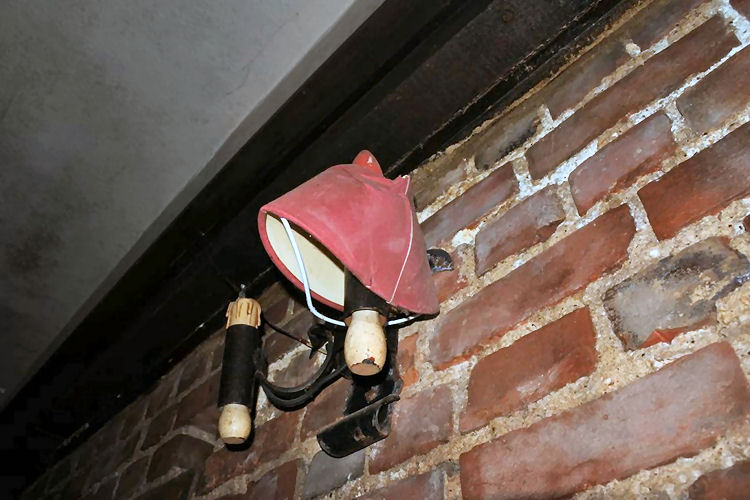
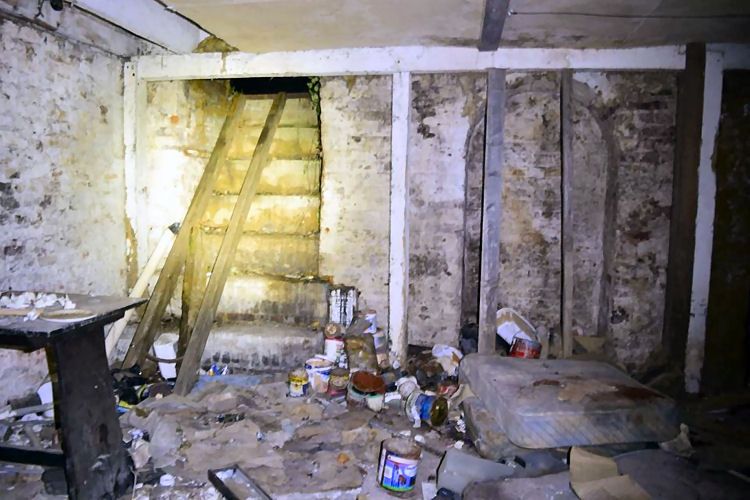
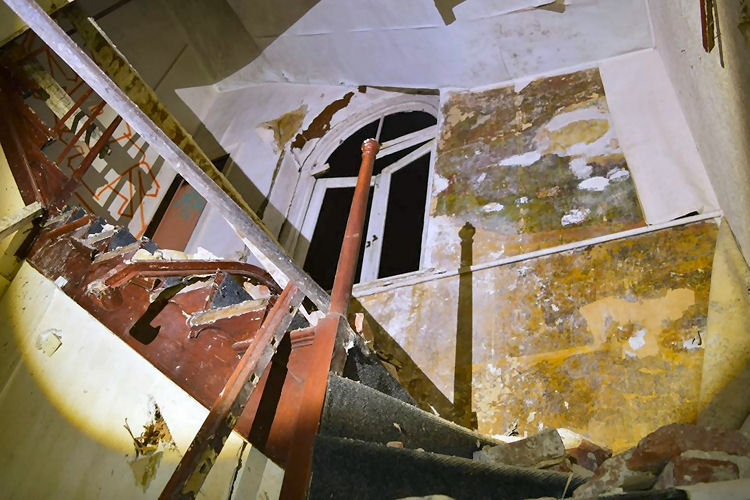
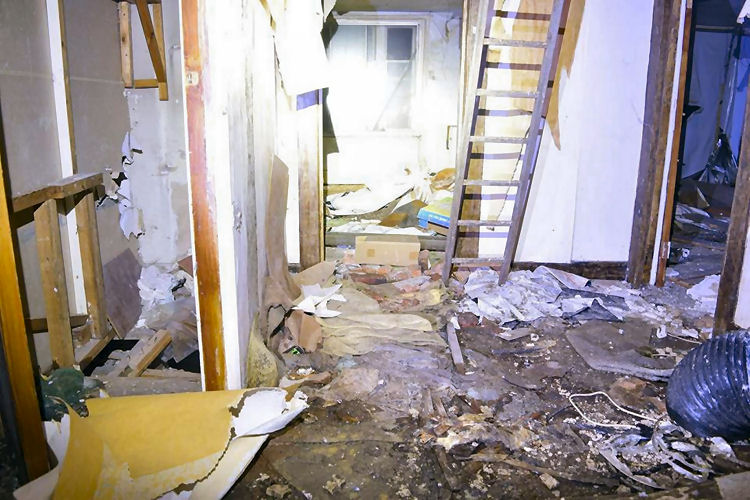
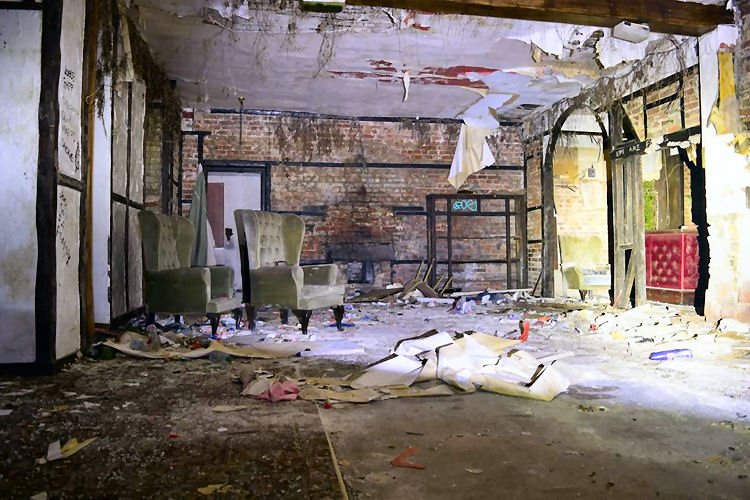
“It was a unique explore that was once a picturesque French themed
location, with so much history which has now been reclaimed by nature,”
Mr Webb said.
The hotel, located halfway between Dover and Canterbury, was two star
and was believed to have originally been run by a French chef.
Before being called the Old Coach House the hotel was named The
Halfway House, and most of its business was thought to have come from
travellers walking down the Dover Road from the port to Canterbury.
The building had three floors and a cellar, including 10 rooms for
guests.
An old advert for the hotel read: “Half way between the beautiful and
ancient city of Canterbury and the coastal port of Dover, this
traditional coaching inn exudes rural charm, and has been a place of
rest and relaxation for travellers for generations.
“The owners have been careful to retain many of the original features
and fuse them with modern amenities for your convenience. The staff is
always on hand to help you enjoy your stay.”
But in 2013 police raided the hotel and discovered 660 cannabis
plants which could have made £1.5 million a year for drug dealers.
Two men were jailed after managing to bypass electricity meters to
power the lights and hydroponic systems which cultivated the plants.
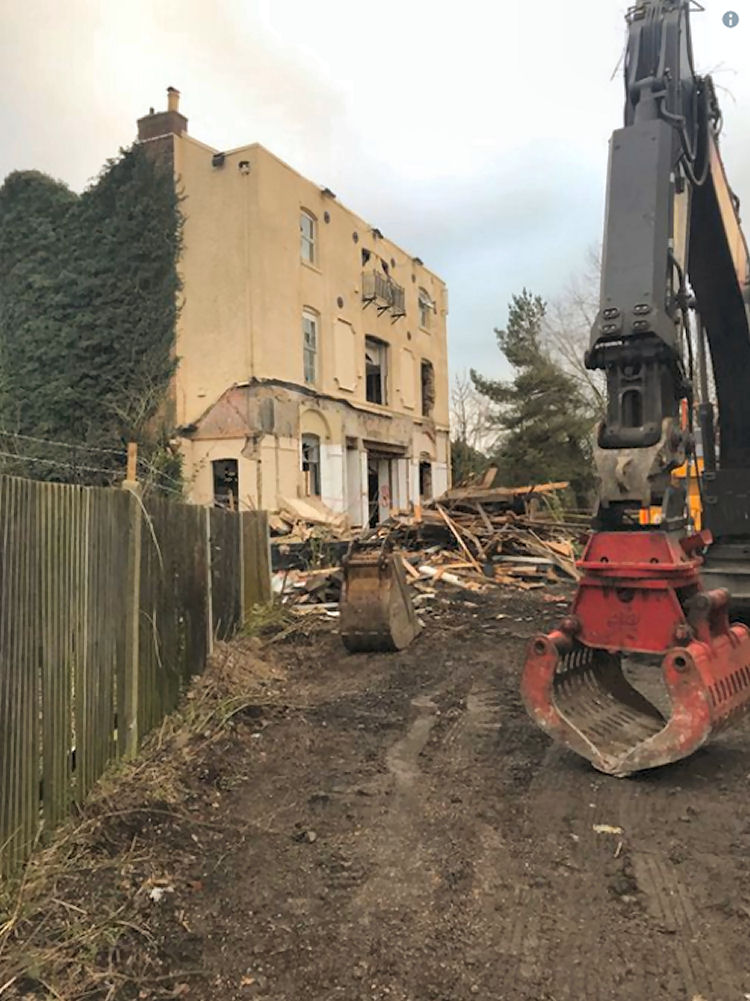
The demolition of the Old Coach House Barham has commenced making way
for a new Clague designed 104 bed hotel with conference facility.
|
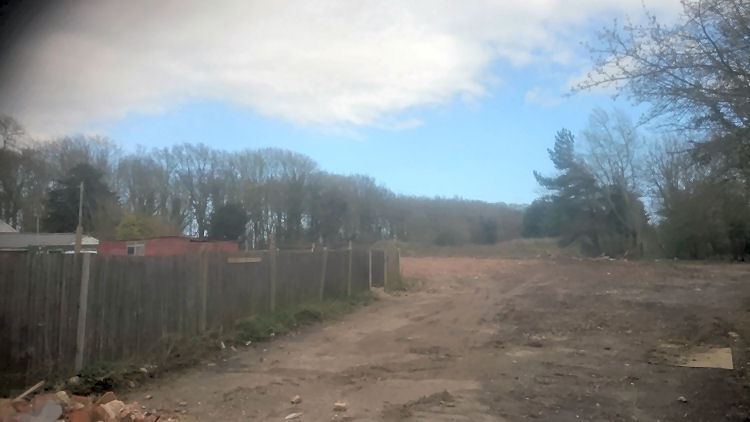
Above photo, April 2018, kindly taken and sent by Rory Kehoe. |
LICENSEE LIST
HOSKINS Martha 1841+ (aged 49 in 1841 ) )
ARTER Edward 1851-61+ (also farmer age 46 in 1861 ) )
WANSTALL James 1867
ARTER Frederick 1868+
ARTER Edward 1881-82+ (also farmer age 70 in 1881)

NORRIS Thomas 1900+
CASTLE George Henry 1903-Oct/16
 
BEST Joseph 1918+
WOOD George to Mar/1921

STANLEY Mr Thomas Mar/1921-Mar/22

SIMONS Percy Robert Mar/1922-Nov/23

HOPKINS John Alfred Nov/1923-Aug/25
 (Of
Dover) (Of
Dover)
 SMITH Herbert Walter Aug/1925-Apr/1931
SMITH Herbert Walter Aug/1925-Apr/1931


THORNBY Charles Apr/1931-Sept/32

WHITLOCK Mr John Sidney Sept/1932-Oct/33

KING Ernest Oct/1933-34+
 
GASSON Mr Charles Albert to Dec/1938 end

BETTERIDGE Mr Albert Gordon Harold Dec/1939-Nov/40

QUESTED Mr E Nov/1940+

QUESTED L Mrs 1961+
GRACE Mr 1960s+
https://pubwiki.co.uk/HalfwayHouse.shtml
http://www.closedpubs.co.uk/oldcoachhouse.html
 From the Post Office Directory 1882 From the Post Office Directory 1882
 From the Post Office Directory 1913 From the Post Office Directory 1913
 From the Kelly's Directory 1934 From the Kelly's Directory 1934
 From the Dover Express From the Dover Express
 Census Census
|


























